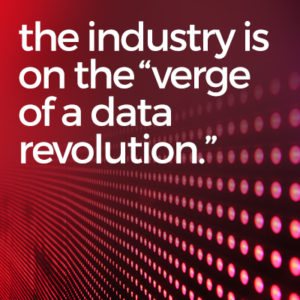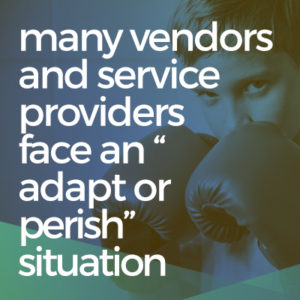
The preamble to the keynote as presented by DIA leadership demonstrates that the DIA has its finger on the pulse of the industry. It was announced that the industry is on the “verge of a data revolution.” This period in time is critical for clinical trial data integration and requires “global data sharing and collaboration,” something the DIA plans to facilitate.
In case you missed it, the DIA added a chief data officer in April and is now looking to launch a number of data-oriented best practice initiatives with names like “Thought Catalyst” and “Capability Builder.” The DIA and the membership-at-large see the importance and value of carefully curated data. This was our first glimpse to the DIA’s foray into providing additional services, and we will be listening to see how as a premier data processing and interoperating platform company, we can help.
The keynote was followed by a panel of experts dwelling on the sensitive topic of health data management ethics. We can’t say that the panel was able to solve any of these challenges, but the following comments caught our attention.
Who owns my health data?
As we increasingly rely on patients to provide more and more of their health data, the ownership of this data is still not clearly defined. Earlier in the year at HIMSS, we learned that an HHS rule 
In clinical trials and research, we have been given the green light by the FDA as per the guidance issued last June on how to ensure compliance while using such data directly. However, the HHS mandate and the FDA guidance only address domestic sites using US based EHRs. This leaves clinical trials that are running globally in a quandary to address their data sources by geography. This will be a challenging problem requiring careful data governance and data integration management.
All international regulatory bodies are paying attention, and the prospects look promising, but in the meantime, expect a wide variety of data sources, formats and protocols before we can fully realize the dream of global data sharing. We at Adaptive Clinical believe that it is within reach.
Data dividend in research
Once we solve the interoperability problem as noted above, we get to the real and non-technical challenges of data sharing. Issues such as:
• Who can benefit from analysis of a patient’s data?
• Should they be compensated for using their data?

Liquidity of data
This comment from the panel of experts can be interpreted in multiple ways. On the surface, clinical trial data was always fluid, and as new information arrived from visits, it had to be managed so as to affect the resultant analytics tables. This results in the need for eClinical systems that can handle data both in motion as well as at rest. This may sound like a lot of technical jargon, but think back to when paper CRF forms were collected vs. now with direct data capture (eSource) where the fluidity of the data collected has increased. We also argue that the velocity at which data is being collected has increased significantly.
It is amazing that we still have an 8-day lag time for data collection from visit to EDC. If we layer data collected from wearables with literal streams of data — more appropriately the deluge of data — then we see that an 8-day lag is simply unacceptable. This “flow” of data from eClinical tool to another quickly requires an intelligent funnel to control the flow using a rule-based middleware.
Why Adaptive Clinical
As more and more vendors displayed Adaptive Clinical’s eClinical Bus in action at the DIA, the importance of and control of data based on smart rules has become apparent. Also, this year we saw a significant increase in point solutions ranging from AI and expert systems to predictive analytics tools, each consuming different data sources and generating more data points that now need to be managed. As organizations build out their platforms and integrate new sources of data, they are taking into consideration the cloud and its ability for varying customer needs. Gartner refers to ascendancy of the cloud and its critical importance today – so much so that many vendors and service providers face an “adapt or perish” situation.¹

Adaptive Clinical’s eClinical Bus® can easily integrate third-party technologies into an interoperable, efficient, and accurate clinical trials system that streamlines processes and improves data reliability and offers the freedom to choose the best eClinical tools of any third-party or proprietary systems while enjoying all the benefits of a fully integrated system.
